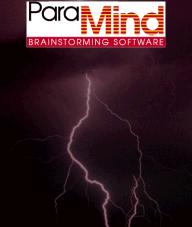ParaMind Brainstorming
Software has
announced a project for the Internet: a site for unique and useful
computer-generated writing. Using a theory known as telical syntax
exhaustion, or, the purposeful exhaustion of the interaction of
words, ParaMind users worldwide can donate
new idea-lists to this site and browse what others have done. We are
presently looking for partners in hosting this information on their web
server.
The theory of
telical word-interaction exhaustion states that progress does not have to
be held in check by the tinkering of man, but by re-thinking the discovery
process. By attempting the exhaustion of the meaningful interactions of
words, we will be able to find out all manner of novel directions, and
discover answers to problems that have been plaguing us for years.
Our dictionary contains all the words that the books of our library
contains. Our libraries are merely the intelligent interactions of the words of our
dictionary in logically meaningful ways. If we were to exhaust the logical
meaningful interactions of our words we would come up with new discoveries
that we are bound to stumble upon in the future by pre-existing means.
Since we are not trained to treat ideas as a plastic medium, we can only
come across new ideas by trial and effort, and by mental associations created
by our physical brains.
We must have an unbiased look at the toolbox of language for being the
seeds of all possible knowledge available. We can't put restrictions
on the amorphous form of the new by our learned language patterns.
The logical quantum-leap in thought is
the idea that ideas can be treated as a plasticity and only by examining
huge quantities of idea-lists will we grow faster than how our minds
currently experience breakthroughs. There must be some rules and these
rules are provided by the context sensitive copy-merge technique and
word-category parsing (both found in the ParaMind Brainstorming program).
It is this program that can radically alter the speed in which we arrive
at better solutions in medical research, ecological solutions for
manufacturing science, even social mediation. In fact, the cognitive
expansion of whatever problem ails us can be helped by this technique.
The process of telical word-interaction exhaustion develops a change in
the perceptions of potential reality, the value of how things could be
compared to how things are. We need to see how the future could be, the
best possible scenarios.
ParaMind and the Internet Site for Computer Generated writing is a tool
for seeing potential reality. The new science of telical word-interaction
exhaustion is a description of all that could be, because it is an
unbiased use of pure language. It is a use of language outside the mind of
man. It is Artificial Intelligence planned out by both man and computer.
Why the Internet? Never before has there been a means of hooking up
together people who have the insight to achieve what we before have
thought to be the impossible. This idea can get so advanced that there
must be a networking of those who can use it and discuss it with others.
The Internet offers complete indexing facilities so that other uses of
ParaMind can look at the work done by ParaMind users around the world.
This Internet site must contain a database of ideas that are new,
useful and unique, ideas which are not quite incorporated into our present
world. Science fiction novels are a great area for such ideas. Any other
area producing such ideas are welcome. Idea-lists from this "new, useful
and unique" idea database would produce valuable library findings.
Imagine thousands of variations of the most exciting science-fiction
ideas, ideas which have only been touched upon in a few sentences by
science-fiction authors.
To accept telical word-interaction exhaustion does not necessarily
mean people who use this technique actually believe that they
will exhaust the meaningful interactions of all words. One uses it as an
expository technique of any given area. Telical word-interaction exploration
is a research technique based on this theory.
We can get at a framework for the meaningful exhaustion of the
interaction of words. If we draw out the basic linguistic truth that ideas
can be broken down into words, and the different interactions of words
equalling different ideas, we must admit that by an exhaustion of the
interaction of words, we will be able to discover many ideas
available to us. This is the premise of the telical exhaustion (or
purposeful exhaustion) of the interaction of words. All humanitarian
research in medicine, social theory, politics, and mediation can be helped
by this technique because it helps people think in a truly unbiased way
with the criteria they need and want to use. We use our minds to
associate a few ideas here and there, and our mind catalogues the
information that we have learned. But there are things that our mind has
not learned, there are things that it has forgotten, and there are
possibilities in which it is unable to see connections and new directions.

